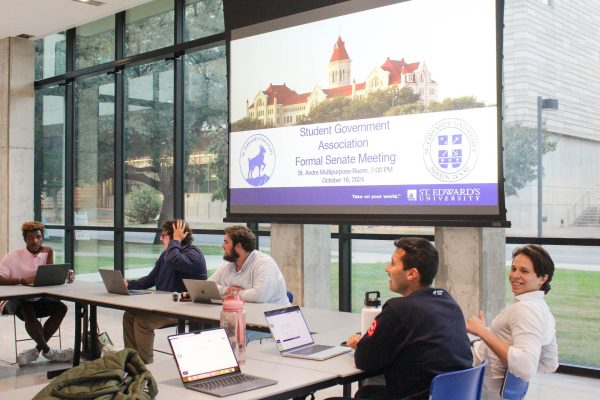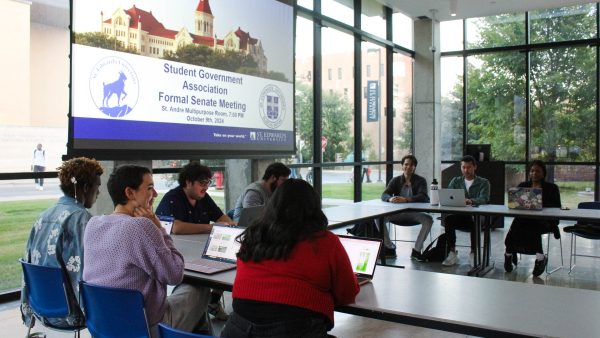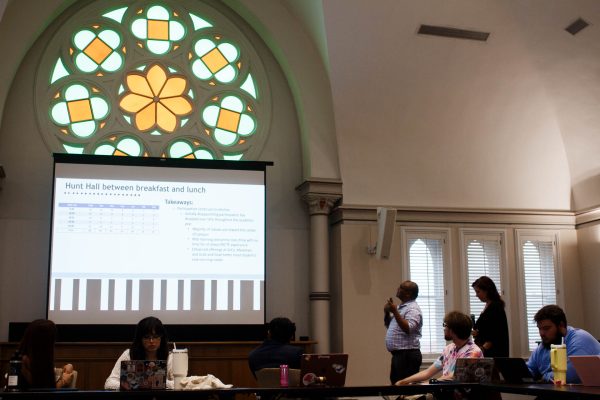Smoking bill revisited by SGA
St. Edward’s University Student Government Association, SGA, is revisiting efforts to address community concerns regarding tobacco use on campus. They are again pushing new legislation that may limit or ban the smoking of tobacco and E-cigarettes in most public areas on campus.
“The numerous times we were approached by students led us to embark on an exploratory venture to better understand the students feelings on smoking,” said Brady Faglie, president of the SGA.
Faglie said that many students are wishing to have legislation regarding smoking to be put into campuswide implementation.
Faculty have also raised concerns of smoking on campus.
Richard Kopec, president of the Faculty Senate, reported that, in a Faculty Senate meeting held Jan. 11, the Senate discussed complaints from faculty who have been experiencing asthma attacks due to the large amount of people who smoke under the arches at Trustee Hall. The Senate went specifically to the SGA to resolve this issue.
In an effort to maximize their knowledge on what the students truly want to do about smoking, the SGA held two public forums in the past year, one taking place in the fall of 2011 and the other during the spring of 2012.
Both efforts garnered little understanding of student opinion for the SGA, Faglie said.
“The forums were too limited in spectrum and we didn’t feel like they were an accurate representation of the full student body,” said Octavio Sanchez, senator for the SGA.
Sanchez, also the writer of this new piece of legislation and champion of the cause to limit smoking on the St. Edward’s campus, has met with faculty and other university officials in order to figure out how to properly approach this issue.
“We’ve had meetings with President Martin and his representative Dr. Pacheko, the head of facilities and numerous others in order to figure this thing out,” said Sanchez. “We wanted to be realistic in our attempts to figure out how to approach this issue.”
Faglie and Sanchez plan to conduct a survey this semester. A large portion of the survey will include questions about tobacco use on campus.
The SGA hopes that they will be able to market the survey to a wide enough group of students who will be able to reciprocate their feelings for change.
“If we can get enough students to participate in taking the survey we will be able to better define our stance on this controversial issue,” Faglie said. “We’re looking to get 1,500 participants minimum before we move on voting on this issue.”
Faglie is currently exploring options for ways to reach such a large number of students in the short time before the voting on this bill is to take place.
“We’re playing around with a bunch of different options including contacting students through Facebook or by e-mail or face-to-face interaction in order to show how beneficial it is for students to take these surveys,” Faglie said.
Sanchez said there are four different ways that the smoking legislation may fall after the survey has been given out to students: smoking on campus will either be left alone, limited to specific smoking areas or banned from all public spaces, such as the arches at Trustee and the ramp outside Moody.
In the last option, the bill separately calls for the possibility of making St. Edward’s a tobacco-free campus. This piece of the legislation would also limit those who smoke hookah, chew tobacco and partake in tobacco consumption in other ways, as well as smoking.
This proposed tobacco-free policy is the same one that the University of Texas at Austin has also put into place and that the County Commissioners of Austin have unanimously voted on in order to ban smoking from all public spaces within the city limits, the Austin-American Statesman reported.
Overall, the SGA said the smoking bill will only be implemented as it has been voted on by the St. Edward’s community and that the students will be the ones who finalize the decisions to be voted on by the council.
The SGA uploaded videos on their website in which they describe the hazards of smoking and tobacco use.
Sanchez believes that if passed, the new bill will ease the worries of non-smoking students and students that wish to quit smoking.
“Popular opinion will inevitably dictate what the policy will be,” Faglie said.











